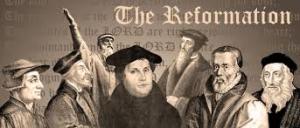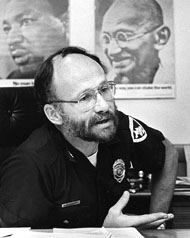
As a pundit[1] for the past two decades, I find myself finally realizing what I had hoped for when I began writing Arrested Development. My hope is that the craft of policing would finally come into the arena of public scrutiny after having been left in the woods for too many years.
The first indication that something was changing was the reaction as to how police responded to the Occupy Wall Street Movement in the fall of 2011. There was conversation throughout the country on how police should respond to public protest; that is, without excessive force and, at the same time, enabling this Constitutional right. That went on for a while and then there was Ferguson three years later and then everything really changed.
We may be in the midst of a “reformation” of our nation’s police — a police service that consists more of “guardians” than the “warriors” of the past who waged “wars” on crime and drugs and used methods like “stop and frisk” to try and fix our urban problems. Of course, the police were not alone in this rush to engage in warfare as elected officials, legislators, prosecutors, judges, and prison officials joined in a multi-year frenzy of arrest and incarceration and getting tough on crime.
While there is no video record of Officer Darren Wilson’s encounter with Michael Brown and his companion, the death of Brown in 2014 caused an outbreak of grief and rage from black Americans who had simply had enough with regard to being roughly and disrespectfully treated by far too many police.
Since Ferguson we have all seen a flood of citizen-initiated cell-phone videos that have captured acts by police across our nation that have ranged from blatant murder in the case of Walter Scott’s death in North Charleston to the shooting of Laquan McDonald, a young black teenager, shot 16 times in Chicago a year ago and the officer recently charged with murder. Far too many, questionable uses of force and far too many deaths of black men at the hands of our police.
The result has been an virtual uprising by black Americans who have coalesced around the “Black Lives Matter” movement and mounted significant protests in almost all our nation’s major cities.
We can no longer continue with our current policing practices. Reform must now occur; it must happen.
I believe that the result of this video documentation by thousands of citizens has been a significant erosion of the trust we have in our police whether an event has happened in our own city or not. (Just scan YouTube with the query “police brutality” and see for yourself. Just this month alone their have been 38,000 videos posted and over 800,000 so far this year.)
It is a national erosion that needs to be addressed by every American city because there are no national standards for police and no federal control outside of federal investigations of civil rights violations of police — a carry-over from the Civil Rights Movement. Each city and county with a police agency must undertake its own reformation. Add to this the reluctance of public officials and community leaders to take on the police and demand the changes that most of us know are needed, it is not very encouraging.

Recently, I wrote about three of those changes that must immediately be made:
- More control by police in their use of deadly force.
- Unconditional respect by police toward citizens in all of their encounters.
- Increased proximity in the delivery of police services (neighborhood assignments and working collaboratively with community leaders in solving local problems).
And this will not be easy. Working against reformation are the police themselves, even their leaders, few of whom actively embrace the changes that must be undertaken. While we have no national standards, we do have laws, the Bill of Rights, and the recent work of the President’s Task Force on 21st Century Policing and the recommendations they have made.
As a person who is quick to give his opinion of what needs to be done (see my earlier posts on this site: 2013, 2014, 2015.) I have always felt that the job of improving work systems is a leader’s job. And what am seeing and hearing throughout our nation is a deafening silence from those who lead our police. Simply stated, they are not standing up, they are not addressing the problem of deadly force use and they are not proposing ways to rebuild the trust and support that is necessary for a police in their communities to be effective and worthy of public trust.
Permit me to be even more blunt: police and civic leaders must answer the demand I hear from communities of color: “Stop killing us!” There is an answer to this demand and I have tried to articulate that in a number of posts on this site. The answer involves a number of actions:
- The police department affirms its role in guarding and protecting our civil rights and honors the sanctity of life – all lives.
- That steps will be taken to align the policies, training, attitudes, and direction of the police department to preserve lives.
- The department is committed to respectful interactions with all members of the community and treating everyone with dignity and respect regardless of the situation or provocation.
- The department is committed to working closely with neighborhood residents by generously listening to them and working with them on community problems they identify.
- The department is committed to fielding an educated, well-trained, and diverse workforce and realizes that the community needs to help them do this by encouraging community members to join the police.
I have written extensively on other things that must be part of this “reformation;” you can see them HERE.
The stakes are enormous. If we fail now to repair the breach between police and communities of, shall I say, “difference” — race, ethnicity, religion, national origin, sexual orientation, belief systems, etc., we will never be able to realize the goals of a free society that our Founders so passionately dreamed and carefully crafted.
If we permit police to hunker-down, exclude themselves or otherwise fail to engage in this discussion, we will lose our way and devolve into a para-military police oriented toward control and authoritarian behavior.
The one thing I worry most about now is that the present threat of terrorism (after Paris) will enable police to continue their military orientation under the guise of “public safety” and fail to engage in the reforms that are so desperately needed.
Now is the time to reform. There can be no excuses for not doing what so obviously needs to be done.
[1] pun•dit (pəndət) 1. an expert in a particular subject or field who is frequently called on to give opinions about it to the public; “a globe-trotting financial pundit.” 2. Synonym: expert, authority, specialist, master, guru, sage, savant, maven. 3. Origin and Usage: Hindi paṇḍit, from Sanskrit paṇḍita — learned. First known use: 1672.


Reblogged this on e-Roll Call Magazine.
LikeLike
One ting that NEEDS to be changed and changed NOW is the BS line “I feared for my life” if one ACTUALLY feared for his life he/she should pursue a different trade. If firefighters feared for their life’s they would NEVER enter a burning building, if a combat solder/marine/airman/sailor feared for his life we would NEVER win a battle. “D” day would have been a total failure, and we would either be conversing in German or Japanese.
John
LikeLike
Being in fear for your life is not a “BS line.” I think many firefighters and soldiers would admit they feared for their lives. The “BS” part, I would say, is that because of that fear you can then do whatever you want.
We all face fear at different times in our lives. For police officers in the line of duty, we need to accept and prepare for that fear and think about making sound and moral decisions in the midst of that fear.
As has been stated on this blog before, one of the most important ways to reduce police use of force incidents, and most importantly police brutality, is the concept that actions must not only be legally justifiable, but morally justifiable as well. All police leaders must instill this mindset in themselves and other officers.
LikeLike
Well said, James. You got it! Thanks.
LikeLike
Problem is that many cops and firefighters don’t want to admit that they are scared because 1) it is not manly to say something like that especially in that line of work; 2) their fellow workers would mock them for saying something like that; 3) their fellow workers would tell them to quit and find employment somewhere else; 4) their fellow workers would question them and/or trust them to do their job when the stuff hits the fan.
LikeLike
If a soldier/marine/airman/sailor feared for his/her life, not only would the war be lost but we would be having court-martials in session forever. Then again, we would not be having wars if military people refuse to fight and we could have peace on earth.
You would think after what the police did to the white protestors before and during the National Republican Convention in 2008 and to the Occupied Wall Street movements across the nation, the white people would have gotten off their butts and start pushing for police reforms. Instead it is the minorities and poor people along with civil rights organizations like the ACLU that are shouldering the burden and causalities when it comes to pushing for police reforms.
LikeLike
So true. The fact is that we are all in this together. This is not just about racism but many of its fellow-travellers: the poor, youth, mentally ill, immigrants… Many folks don’t realize today that we all have “skin” in this game of improving our police.
LikeLike
Many folks don’t realize that all of us are fair game for the police until it happens to them and then they finally get the message that minorities have and organizations like the ACLU been telling them for years
LikeLike
Reblogged this on Improving Police and commented:
Once more…
LikeLike
Winston Churchill Said;
Justice is the “most unfailing test of civilization of any country”
Taking an Oath, not honoring that oath and thinking nothing will happen is as ridiculous as thinking nothing will happen if you step off the Toronto CN Tower. Folks you are bound by your oaths, you really get away with nothing and that’s a fact just like gravity has it’s consequences and they apply even to those who don’t believe and think they are above God Laws and Newton’s Laws.
” Justice Delayed is Justice Denied ”
It has been said; That justice must not only be done but it must be perceived to have been done.
Bourque, Clarence : Attempted Murder – File: 2008-239460
During the early morning hours of June 2, 1981, Constable Clarence Bourque, a member of the Shediac Town Police Force, was on patrol. At approximately 1:15 a.m., Cst. Bourque observed a male individual walking (stumbling) on Main Street near the high school. Cst. Bourque believed the individual was intoxicated and subsequently approached him. Upon being asked, the individual returned to the police vehicle with Cst Bourque but refused to get in and ran. Cst. Bourque gave chase and when the individual stumbled and fell, Cst Bourque attempted to handcuff him. A struggle ensued, during which the individual got a hold of Cst. Bourque’s revolver and shot him at least three times. The individual left the scene in the police vehicle which was later located semi-submerged in the waters of the Northumberland Strait at Cap Bimet, N.B.
Should you have any information on the attempted murder of Clarence Bourque, please contact the RCMP Major Crime Unit (South) at 506-452-3491 or Crime Stoppers at 1-800-222-TIPS(8477).
Web Page of Unsolved Major Crimes; http://www.rcmp-grc.gc.ca/en/nb/unsolved-homicides-suspicious-deaths
LikeLike